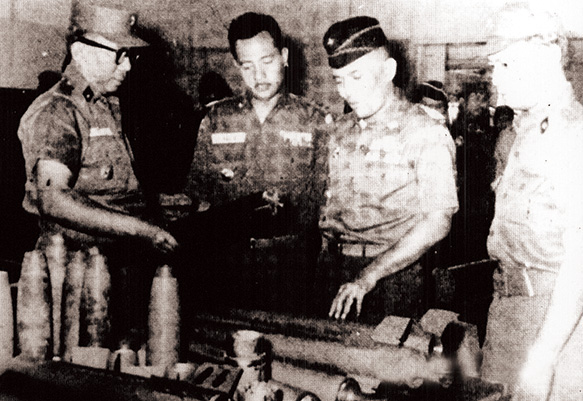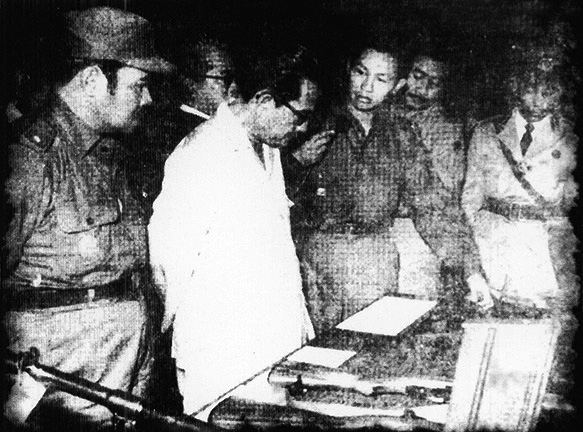The result of Konferensi Meja Bundar orKMB (Round Table Conference) in Den Haag, Netherlands stated that the Netherlands acknowledged the sovereignty of Indonesia to the Republik Indonesia Serikat (United Republic of Indonesia) on December 27, 1949. Along with that, Netherlands was also obliged to hand-over its assets gradually to the government of Indonesia under President Soekarno, including the LPB.
Later on, LPB was renamed to Pabrik Senjata dan Mesiu or PSM (Weapons and Ammunitions Factory) which was managed by the Indonesian National Armed Forces (TNI-AD). Since then, PSM started to conduct series of experiments to produce barrel and succeeded in producing 9mm-caliber barrel. PSM succeeded in producing 7.7mm-caliber barrel in November 1950.
PSM was facing a crisis of experts as the foreign workers should return to their home country based on the Government Regulation. Therefore, there was a centralization of organization by cutting down the production lines from 13 to 6 lines with a new line of Munisi Kaliber Kecil or MKK (Small Caliber Munitions). PSM was also modernized the factory by purchasing new machinery for manufacturing weapons and munitions, spare parts, materials and other military equipment.

After running for eight years, PSM was renamed to Pabrik Alat Peralatan Angkatan Darat or Pabal AD (Army Equipment Factory) on December 1, 1958. Pabal AD did not only produce weapons and munitions but also other military equipment to reduce Indonesian military equipment’s dependence on other countries. Numerous potential youth was sent abroad to study about weapons and ballistic.
During the Pabal AD era, there were several developments in weapons technology. Pabal AD cooperated with European weapons companies for the purchase and construction of a weapons factory unit that succeeded in building a small weapons factory. The success turned Pabal AD into the main implementing institution for the Indonesian National Armed Force (TNI-AD) as the industry installation. Various products were also produced successfully by Pabal AD. Moreover, in this era, the Netherlands government handed-over the Cassava Factory, a cassava flour factory located at Turen, Malang, East Java – which later on became the location of the Munitions Division of PT. Pindad (Persero).

Around 1962, Pabal AD was renamed to Perindustrian TNI Angkatan AD or Pindad (Indonesian National Armed Force Industry). The development stage in Pindad era was focused more on the goal to train its workers to adjust with the integrated management principles and the latest technology development. Pindad production process was conducted to support the needs of the Indonesian National Armed Force. Series of experiments and evaluation of new weapons productions was conducted and various Decrees from the armed forces to use Pindad’s weapons as the standard weapons gained. Afterwards, the weapons were mass-produced.
In early 1972, the Indonesian government conducted an arrangement of the department, including Departemen Pertahanan dan Keamanan or Dephankam(Department of Defense and Security, the former name of Ministry of Defense and Security). Therefore, Pindad was renamed to Komando Perindustrian TNI Angkatan Darat or Kopindad (Indonesian National Armed Force Industry Commando) on January 31, 1972. The changes only occurred on the main commando, namely the leadership and technical policy management. The reorganization gave positive impact to the work performance that was previously slow to be agile, passionate and dynamic. Furthermore, Pusat Karya that was changed to PT. Purna Shadana (Pursad) had the discretion to increase the production to support the self-sufficiency and to decrease the dependence on foreign country.
During the Seroja Operation of Indonesian National Armed Force to liberate Timor Timur from Portuguese occupation, Pindad’s weaponry faced lots of obstacles in the field resulting Kopindad to pull back as much as 69,000 unit of weapons that had already been handed-over to the Indonesian National Armed Force. Furthermore, Kopindad transformed and modified several weapons, namely SMR Madsen Setter MK III 30mm Long Caliber to be SPM.1 7.62mm caliber. They produced as many as 4,550 units and designed the SS77 223 Caliber rifle.
In a further development, as a realization of the Decree of the Minister of Defense and Security/Armed Force Commander No. Kep/18/IV/1976 dated April 28, 1976 on the Principals of the Organization and Procedure of the Indonesian National Armed Force, the name Kopindad was restored to Pindad. Pindad changed from the main training commands to the main implementing institution within the army. Along with the changes, Pindad was expected to develop its technology ability and productivity in fulfilling the logistic needs of the Indonesian National Armed Force to reduce dependence on foreign countries. Furthermore, Pindad was also expected to develop non-military facilities and infrastructure that could support the national development in agriculture, plantation, mining, industry and transportation for the government, private and public.



